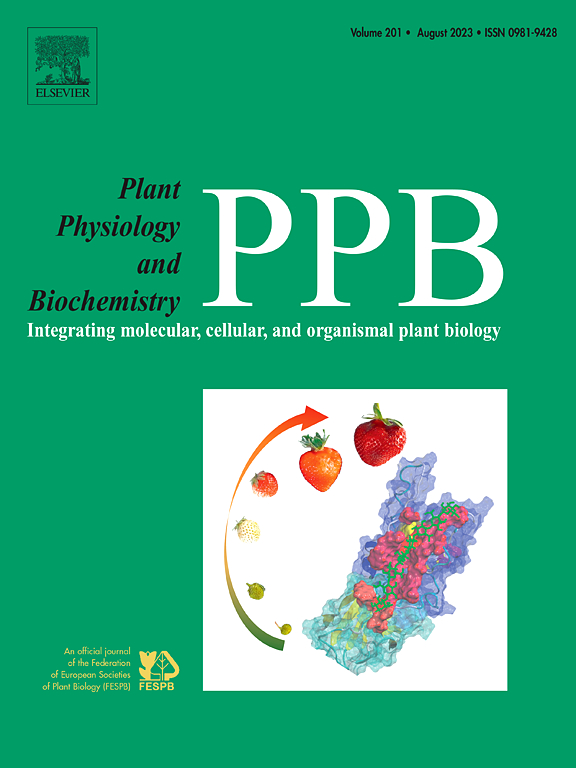Intervention of 2-keto-L-gulonic acid in L-ascorbic acid biosynthesis affects plant carbon metabolism and secondary metabolite accumulation
IF 5.7
2区 生物学
Q1 PLANT SCIENCES
引用次数: 0
Abstract
The role of 2-keto-L-gulonic acid (2KGA), a downstream product of the ascorbic acid (ASA) metabolic pathway, in the biosynthesis of plant bioactive compounds remains to be elucidated. In this study, we investigated the effects of exogenous 2KGA on ASA biosynthesis and secondary metabolite accumulation in the non-heading Chinese cabbage (Brassica campestris [syn. B. rapa] ssp. chinensis cv. Shanghai bok choy). The findings revealed a dose-dependent relationship between ASA accumulation in plants and 2KGA dose, with high expression levels of the L-gulono-1,4-lactone oxidase (GLO) gene, which is crucial for 2KGA to enhance ASA biosynthesis. The ASA content of GLO-deficient (At5g11540, At5g46750) plants showed no response to exogenous 2KGA treatment. Moreover, changes in the levels of total phenolics and total flavonoids were significantly positively correlated with ASA content. Metabolomics and transcriptomics analyses revealed that the increase in ASA content induced by 2KGA and the subsequent feedback effects influenced major metabolic pathways, including the citric acid cycle, amino acid metabolism, and photosynthesis, as well as varied expression of 30 transcription factors. These findings suggest that exogenous 2KGA has the potential to modulate energy and precursor metabolic pathways by interacting with plant ASA anabolism, thereby facilitating growth and enhancing bioactive compound accumulation. Our study provides novel insights into the role of 2KGA in the biosynthesis of bioactive compounds in plants.
2-酮- l -谷醛酸对l -抗坏血酸生物合成的干预影响植物碳代谢和次生代谢物积累
2-酮- l -谷氨酸(2KGA)是抗坏血酸(ASA)代谢途径的下游产物,其在植物生物活性化合物合成中的作用尚不清楚。在本研究中,我们研究了外源2KGA对无头大白菜(Brassica campestris [syn. B. rapa] ssp) ASA生物合成和次生代谢产物积累的影响。对简历。上海小白菜)。研究结果表明,植物体内ASA积累与2KGA剂量之间存在剂量依赖关系,l -古洛诺-1,4-内酯氧化酶(GLO)基因的高表达是2KGA促进ASA生物合成的关键基因。glo缺陷(At5g11540、At5g46750)植株的ASA含量对外源2KGA处理没有反应。此外,总酚和总黄酮含量的变化与ASA含量呈显著正相关。代谢组学和转录组学分析显示,2KGA诱导的ASA含量增加及其反馈效应影响了柠檬酸循环、氨基酸代谢和光合作用等主要代谢途径,并改变了30个转录因子的表达。这些发现表明,外源2KGA有可能通过与植物ASA合成代谢相互作用来调节能量和前体代谢途径,从而促进生长和增强生物活性化合物的积累。我们的研究为2KGA在植物生物活性化合物的生物合成中的作用提供了新的见解。
本文章由计算机程序翻译,如有差异,请以英文原文为准。
求助全文
约1分钟内获得全文
求助全文
来源期刊
CiteScore
11.10
自引率
3.10%
发文量
410
审稿时长
33 days
期刊介绍:
Plant Physiology and Biochemistry publishes original theoretical, experimental and technical contributions in the various fields of plant physiology (biochemistry, physiology, structure, genetics, plant-microbe interactions, etc.) at diverse levels of integration (molecular, subcellular, cellular, organ, whole plant, environmental). Opinions expressed in the journal are the sole responsibility of the authors and publication does not imply the editors'' agreement.
Manuscripts describing molecular-genetic and/or gene expression data that are not integrated with biochemical analysis and/or actual measurements of plant physiological processes are not suitable for PPB. Also "Omics" studies (transcriptomics, proteomics, metabolomics, etc.) reporting descriptive analysis without an element of functional validation assays, will not be considered. Similarly, applied agronomic or phytochemical studies that generate no new, fundamental insights in plant physiological and/or biochemical processes are not suitable for publication in PPB.
Plant Physiology and Biochemistry publishes several types of articles: Reviews, Papers and Short Papers. Articles for Reviews are either invited by the editor or proposed by the authors for the editor''s prior agreement. Reviews should not exceed 40 typewritten pages and Short Papers no more than approximately 8 typewritten pages. The fundamental character of Plant Physiology and Biochemistry remains that of a journal for original results.

 求助内容:
求助内容: 应助结果提醒方式:
应助结果提醒方式:


